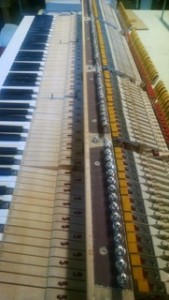Piano Maker’s Corner: Built To Be Played

This month a reader posed the following question for Daniel. I love his answer (and my piano). One caveat: Pianos are designed to stand up to different types of playing. Not all are designed for Rach 2. Daniel also wants us to know that this is a very complex question and they can’t estimate the damage various music pieces can cause to a piano.
My friend won’t allow any of us to play her beautiful Grand. When we have musical evenings, we all have to play on an old upright or digital keyboard. We are all good pianists who don’t pound, but the idea of Beethoven or Schumann or Bartok played with style and dynamic contrast on that Grand absolutely frightens her. I was always taught that that was what the instruments were made to do and playing will not hurt or damage an instrument so long as you use good technique. Am I damaging my piano every time my fingers touch it?
This sounds like a situation we were in a few years ago. A client of our shop called us and she was very upset. Upset that her piano of ten years was having complications with the action being sluggish and slow. After inspection the piano we found that the flanges on her action needed to be eased. She then indicated to us that her piano was in really good condition, that she was the only person who played it, and it was only carefully played a few times a month.
I had to tell her that contrary to popular belief, a piano is meant to played (exercised) for it to be in good working condition. The parts are made of wood, and if a piano action does not get movement, it can tighten. Normal maintenance and playing of a piano is good for it.
There is also a theory that if a piano is used, parts such as the sound board start to acquire a good tonal quality to it. Exercising of the fibers is really good for the sound board which is why some of the oldest and most prestigious cellos and violins in the world are sometimes still played regularly for this very reason.
A piano is meant to be played and enjoyed. Yes, it is true that use and age of anything will cause harm over time BUT if the item is used correctly and correctly maintained, there should be minimal wear and tear. Even a piano that is in a museum in absolute ideal conditions will deteriorate over time.
The biggest joy that a piano maker or rebuilder has is to hear an instrument that we were involved with. I was once told by a piano technician that a client has to choose between a client living with a piano or the piano living with them. Play the piano. Enjoy the piano. Love the piano.
Daniel Ley
Daniel Ley is the owner of Ley Piano Company in Tucson Arizona, where he carries on a tradition of quality piano care, service, and restoration. In addition to full service piano care, he and his craftsmen build their own modern American grand piano, Monserrat.


